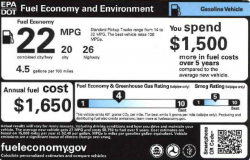
— A $1.2 billion Ford F-150 and Ford Ranger fuel economy lawsuit that was dismissed will remain dismissed as an appeals court rejected arguments that also failed at a lower district court.
In February 2019, Ford announced it had opened an internal investigation into fuel economy estimates regarding 2018-2020 Ford F-150 and 2019-2020 Ford Ranger trucks.
Ford employees realized there may have been problems during gas mileage testing, and even though there was no evidence the estimated fuel economy labels were wrong, Ford hired outside experts to look into the possible problems.
Ford also announced the Department of Justice (DOJ) and the Environmental Protection Agency (EPA) opened investigations into Ford's emissions and fuel economy testing.
Without knowing the results of Ford's investigation or the results of the federal investigations, lawyers filed more than 20 class action lawsuits alleging Ford intentionally cheated on fuel economy tests.
Ford Fuel Economy Class Action Lawsuit
All the Ford fuel economy class action lawsuits were consolidated in a Michigan courtroom under the title, In Re: Ford Motor Co. F-150 and Ranger Truck Fuel Economy Marketing and Sales Practices Litigation.
The consolidated class action is more than 1,000 pages that allege Ford knew the fuel economy estimates on the window stickers were wrong.
Ford allegedly intentionally submitted false fuel economy testing figures to the EPA for F-150 and Ranger trucks. The class action alleges this caused the EPA to provide inaccurate fuel mileage estimates to customers.
According to the lawsuit, Ford did this to induce customers to purchase the trucks.
Specifically, Ford conducted testing and provided the fuel economy figures to the EPA for the F-150 and Ranger trucks.
The EPA then published its fuel economy estimates for those trucks, with the F-150 having an EPA-estimated mpg of 20 city, 26 highway and 22 combined. The EPA estimates for the Ranger were 20 mpg city, 25 highway and 22 combined mpg.
However, the plaintiffs who sued took over as regulators by performing their own fuel economy tests which they said were conducted just like the EPA performs its tests.
The plaintiffs assert they determined the mpg estimates of the F-150 should be 17.7 city, 22.7 highway, and 20.0 combined, with the Ranger being 18.3 mpg city, 23.4 highway and 20.6 combined.
The plaintiffs claim this proves Ford intentionally lied to the EPA and everyone else about the F-150 and Ranger fuel economy estimates.
Ford Fuel Economy Class Action Lawsuit Dismissed
Ford argued from the beginning the plaintiffs and their lawyers didn't understand the meaning of the words, "estimate" and "estimated." And Ford also argued the plaintiffs, lawyers or a jury cannot take on the role of the Environmental Protection Agency and Congress.
“EPA fuel economy estimates are not, and have never been, guarantees of real-world fuel economy performance.” — Ford
The judge dismissed the Ford fuel economy class action because even the EPA said mileage will vary and its fuel economy “ratings are a useful tool for comparing the fuel economies of different vehicles but may not accurately predict the average [miles per gallon] you will get."
The judge also noted the Monroney label (window sticker) must also include a disclaimer indicating, "[a]ctual results will vary for many reasons, including driving conditions and how you drive and maintain your vehicle.”
The judge said an "estimate" is not a "guarantee" and the EPA says its estimates are not "perfect." And the EPA says on-road testing "will often yield different results than those obtained under the EPA’s testing process."
The district court dismissed the $1.2 billion lawsuit by ruling federal law preempted plaintiffs’ state law claims.
Ford Fuel Economy Class Action Lawsuit Appeal
The plaintiffs appealed to the U.S. Court of Appeals for the 6th Circuit which ruled 3-0 that the lower court correctly dismissed the Ford fuel economy class action lawsuit.
The appeals court agreed with Ford that federal law gives the EPA authority to estimate Ford's fuel economy.
The appeals court also noted that by the time Ford filed its motion to dismiss the fuel economy lawsuit, the DOJ had closed its investigation without taking any further action.
And by the time the class action lawsuit was dismissed by the district court, the EPA had also closed its investigation and said no further action was necessary.
According to the 6th Circuit, the lower court lawsuit dismissal was appropriate because the plaintiffs or a jury cannot be allowed to take the place of the EPA on whether fuel economy estimates are reasonable.
"The EPA does not require manufacturers’ fuel economy figures to be stringently accurate, and it warns consumers that estimates may vary. It is for the EPA, not a jury, to balance its own objectives in determining whether fuel economy data is reasonable." — 6th Circuit U.S. Court of Appeals
And the appeals court also ruled the EPA “has at its disposal a variety of enforcement options that allow it to make a measured response to suspected fraud upon the Administration. And, ultimately, the fuel economy figure is the EPA’s own; it is not adopted or published unilaterally by Ford (or by any other manufacturer)."
The Ford F-150 and Ford Ranger fuel economy class action lawsuit was filed in the U.S. District Court for the Eastern District of Michigan, Southern Division. The case is: In Re: Ford Motor Co. F-150 and Ranger Truck Fuel Economy Marketing and Sales Practices Litigation.
The plaintiffs are represented by the Miller Law Firm, P.C., Hagens Berman Sobol Shapiro LLP, and DiCello Levitt Gutzler LLC.




